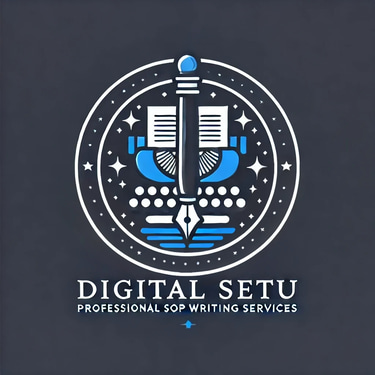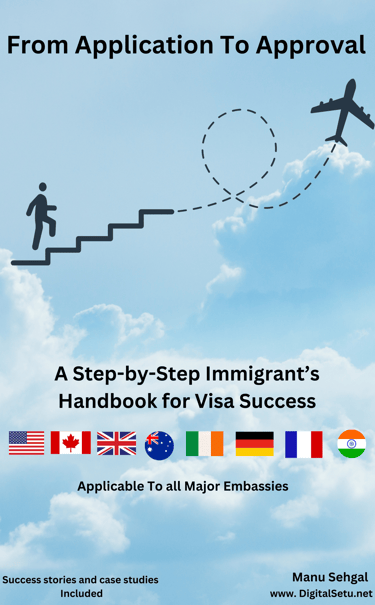7 Major Reasons Why Embassy Refuses Study Visas
Manu Sehgal
6/15/202414 min read
(Click to get our E-book for free step-by-step process, action plans, and pictures.)
Embarking on a journey to study abroad is a transformative experience that promises new opportunities and broadened horizons. However, the path to obtaining a study visa is full of challenges, primarily due to the guidelines set by the embassies. Understanding the reasons behind visa denials can empower prospective students to enhance their applications significantly. This blog dives into the top seven reasons embassies deny study visas, drawing on extensive research and analysis of refusal letters from various countries including Canada, Australia, the UK, New Zealand, the USA, and several European nations.
Introduction: Navigating the Maze of Study Visa Applications
Factor 7: Extensive Work Experience or Multiple Degrees
Many students applying for study visas come with backgrounds that include considerable work experience or higher academic qualifications than the level they are applying to study. For example, applicants who already hold several years of professional experience or possess a master's degree but are applying for a diploma program may raise suspicions about their intentions. This scenario can lead to concerns from visa officers, who might suspect that the candidate's primary aim is immigration rather than pursuing further education.
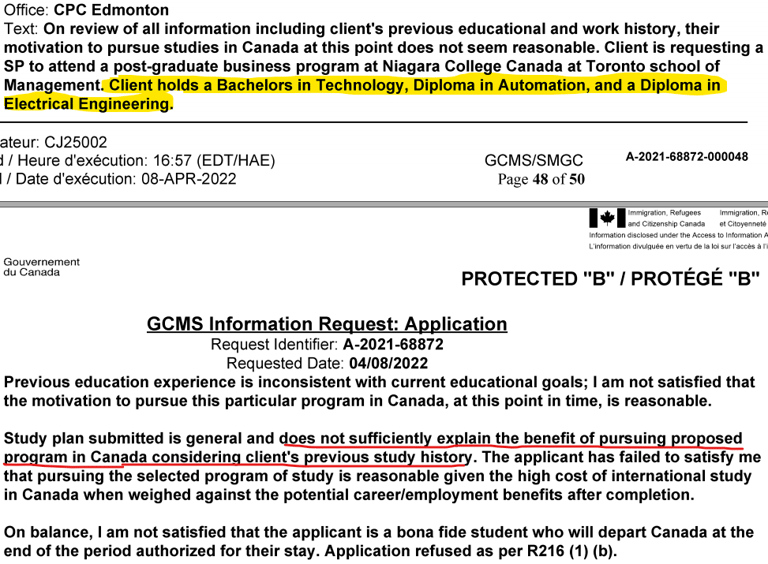

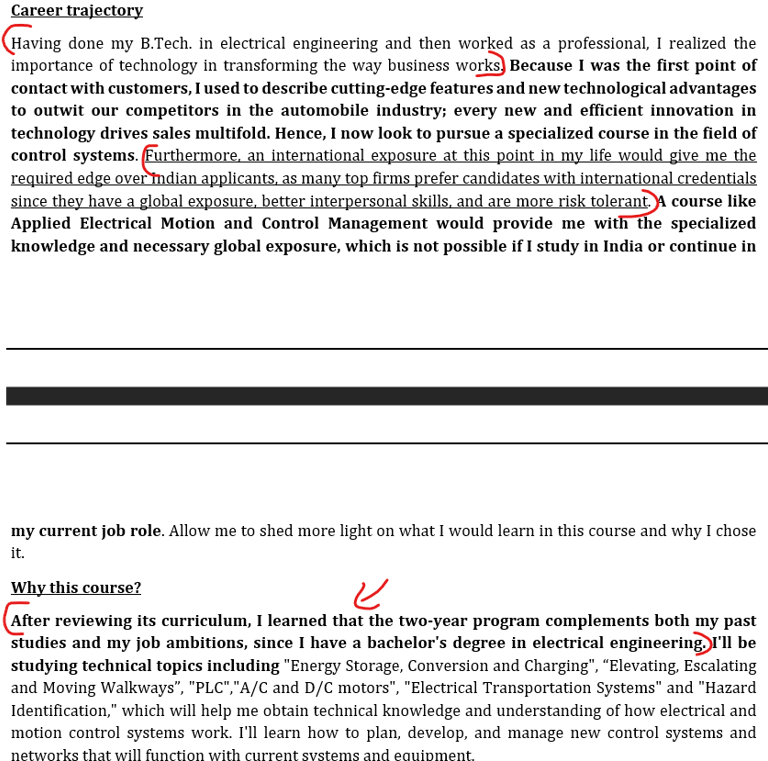

Before - Refusal from Canada saying you have already done a B.Tech and then diploma in your homeland, and now you wish to pursue diploma in Canada.
After- Our team showed Justification in Sop showing how previous education was relevant but at the same time I need further education. ( watch the video of our client's visa. success story of overcoming refusal - https://youtu.be/E6NS5_Ym1EI)
Strategies for Success:
Focus on Learning Gaps: Clearly articulate the specific skills or knowledge gaps that the intended course will fill. Show that you are in need of knowledge and education
Align Career Goals: Demonstrate how the course is crucial for a strategic advancement that your current qualifications do not cover.
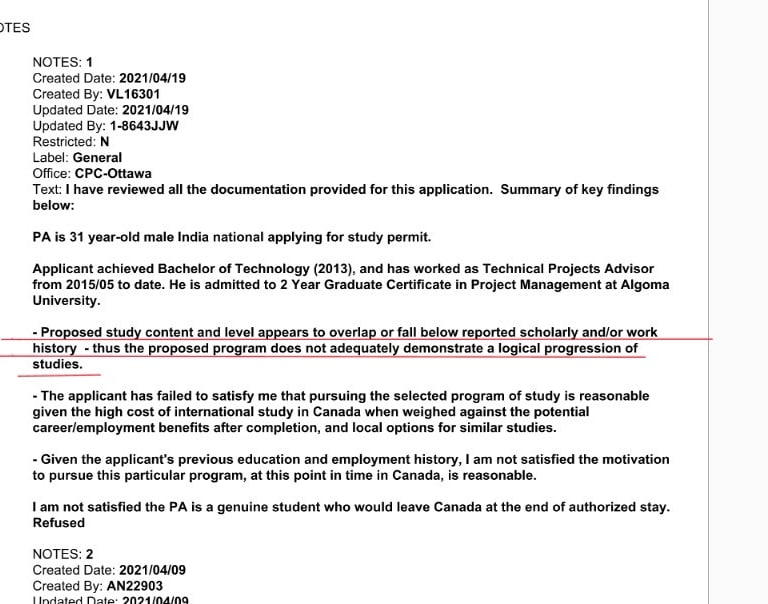

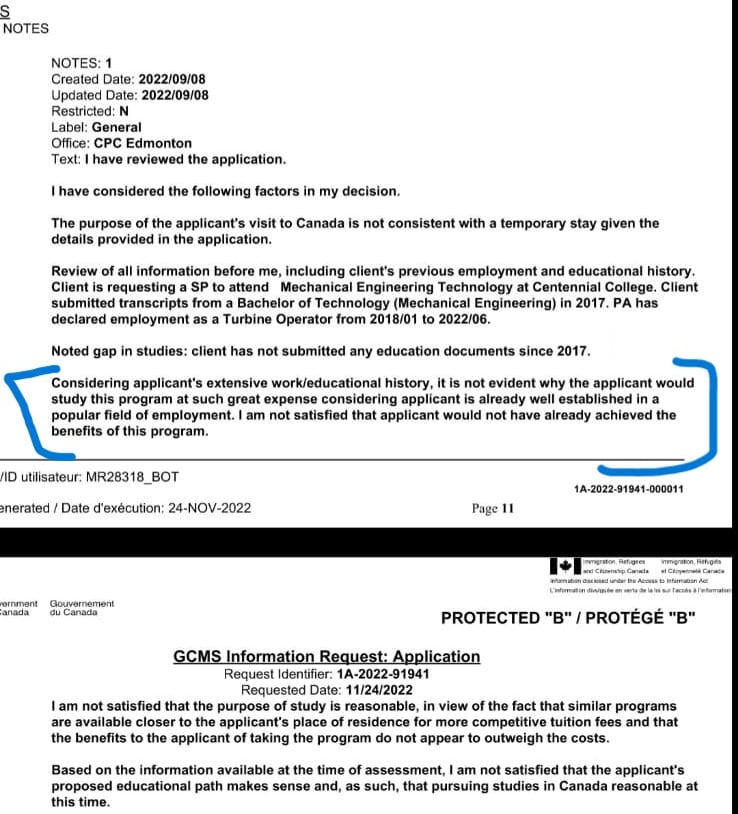

Check out 2 other refusals below, where the chosen program falls below or overlaps previous level of education.
Factor 6- Inadequate Funds or Language Scores
Let us have a look at how the embassy refuses when visa officers get a hint that you will not be able to sustain your stay This happens when your liquid assets(transferrable funds/ salary) are somewhat less than(the tuition fee ( to be paid). Say your remaining fee is Rs. 15,00,000 and you show the salary of your parents as Rs. 10,00,000 and no other form of savings. It is obvious that it will not be easy for you to manage this money and you may get sidetracked from your purpose of studying.
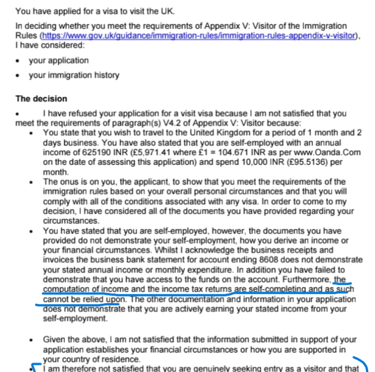

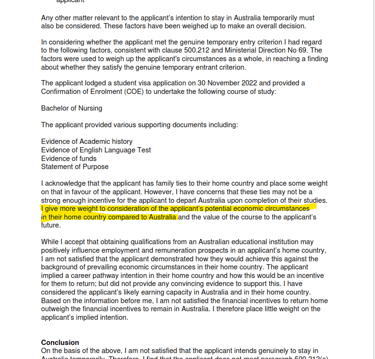

Refusal from Uk on finances
Refusal from Australia on finances
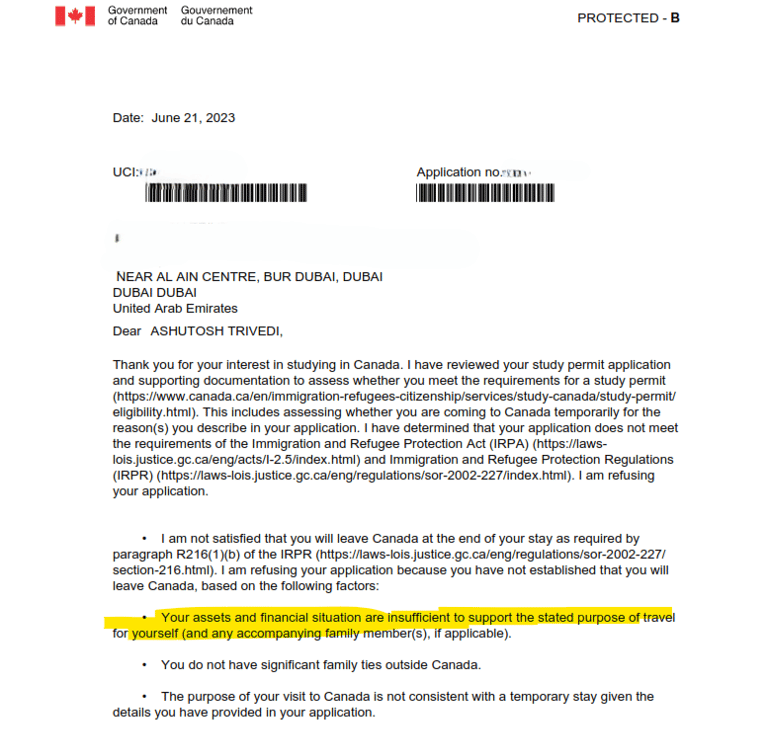

Refusal from Canada on finances
How to Convince Visa Officers of Your Financial Ability
To successfully convince visa officers that you can easily afford your stay and studies abroad, it is crucial to provide detailed and clear evidence of your financial stability. Here are key steps to effectively demonstrate your financial ability:
Detail Your Funding Sources:
Clearly outline who is funding your education and how much each contributor is providing. This could include parents, siblings, or other relatives.
For example: "My education is funded by my father, mother, brother, and sister-in-law. My father has contributed AUD 10,000, my mother AUD 5,000, and my brother and sister-in-law AUD 7,000 combined."
Provide Proof of Payments:
Show that you have already paid a significant portion of your tuition fees and secured other necessary funds.
For instance: "I have paid my first-year tuition fee of CAD 15,000 and obtained a Guaranteed Investment Certificate (GIC) worth CAD 10,000 from CIBC."
Highlight Family Income and Assets:
Detail your family’s overall income and assets to demonstrate ongoing financial support.
Example: "My family's overall annual income is Rs. 14,86,490 as per ITR 2024-2025. We own total assets worth CAD 50,000, including movable and liquid funds."
Document Financial Stability:
Include bank statements, ITR records, and asset certificates to support your claims.
Example: "Our bank statements clearly show sufficient funds to cover my education and living expenses comfortably."
Explain Any Financial Support Programs:
If you receive any scholarships or financial aid, mention these as additional proof of financial stability.
Example: "I have also been awarded a scholarship of AUD 5,000 which further ensures my ability to fund my education."
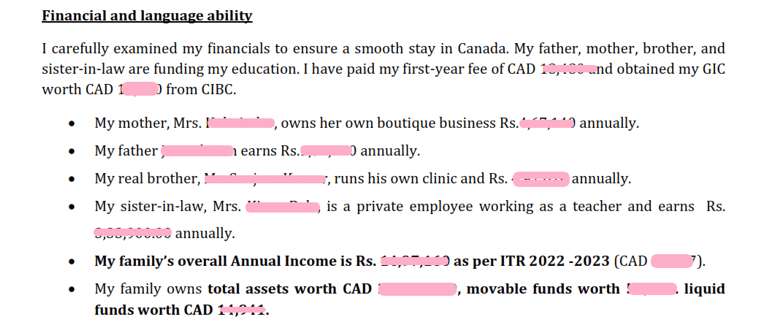

By providing detailed financial information and clearly explaining your funding sources, payments, and family income, you can effectively convince visa officers of your financial stability. This approach ensures they understand that you can afford your stay and are prepared for the financial demands of studying abroad. Using professional SOP writing services can further help in presenting this information in a structured and persuasive manner.
Checkout how we mention in our Sops
Refusal due to low language scores and providing justification
Proving your language proficiency is a crucial part of your study visa application. Visa officers need to be confident that you can effectively communicate and succeed in an academic environment where the primary language of instruction is not your native tongue. Here are some refusals based on language scores.
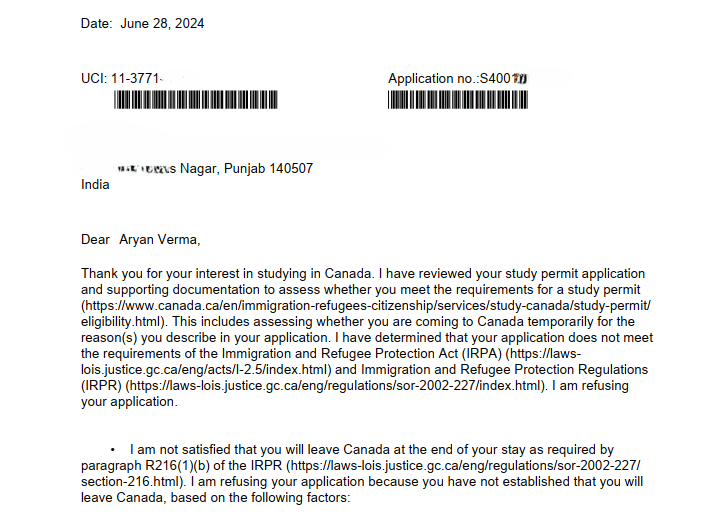

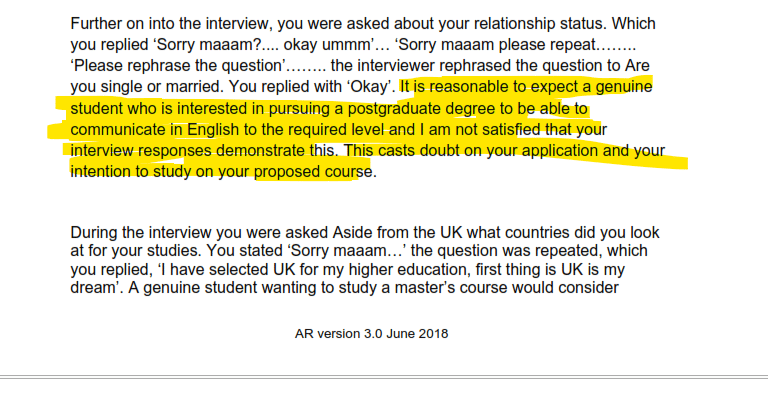

(Check out how our team helped overcome a refusal on language scores by justifying low language scores. We then highlighted academic scores in English and mentioned the minimum required bands by the college ( with a link) .
Refusal from Uk due to low laguage scores
Providing low band scores justification- By providing comprehensive language test scores, explaining any low scores, highlighting real-world language use, including supporting documents, and discussing any improvement plans, you can effectively demonstrate your language proficiency to visa officers.
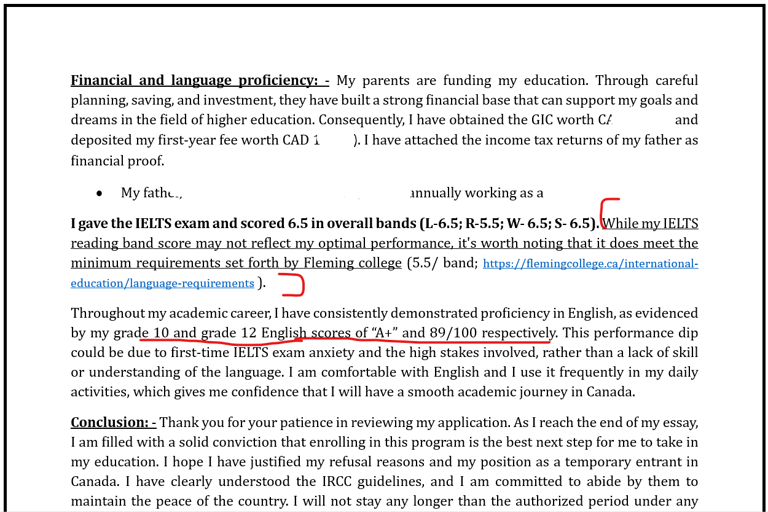

Refusal from Canada due to low language scores.
Success strategies for highlighting financial ability and language scores:-
Success Strategies for Highlighting Financial Ability:
Detail Funding Sources and Proof: Clearly outline who is funding your education and provide supporting documents such as bank statements, scholarship letters, and payment receipts. For example, "My education is funded by my family, with CAD 15,000 already paid for tuition and a CAD 10,000 GIC secured."
Show Comprehensive Financial Stability: Provide detailed information on your family's overall income and assets to demonstrate financial stability. For instance, "Our family's annual income is Rs. 14,86,490, with total assets worth CAD 50,000, ensuring sufficient funds for my education."
Success Strategies for Highlighting Language Scores:
Present Strong Test Scores: Submit recognized language proficiency test scores, such as IELTS or TOEFL. Example: "I scored a band 7 overall in IELTS, with a minimum of 6.5 in each section."
Explain and Supplement Low Scores: Justify any low scores by highlighting daily use and previous academic performance. Example: "Despite scoring 5.5 in writing, I use English daily at work and have high grades in English courses, supplemented by a letter from my employer confirming my language skills.
Our SOP writing services expertly address all factors, including financial and language ability, to strengthen your visa application. With proven success, we ensure your case is compelling and stands out.
Factor 5:- Studying Abroad Despite Local Options Available
When you are a temporary entrant, visa officers often question why you are not studying in your homeland( because any way you have to return). So, they want to understand the necessity and value of pursuing education in a foreign country over local institutions. Let us see some images
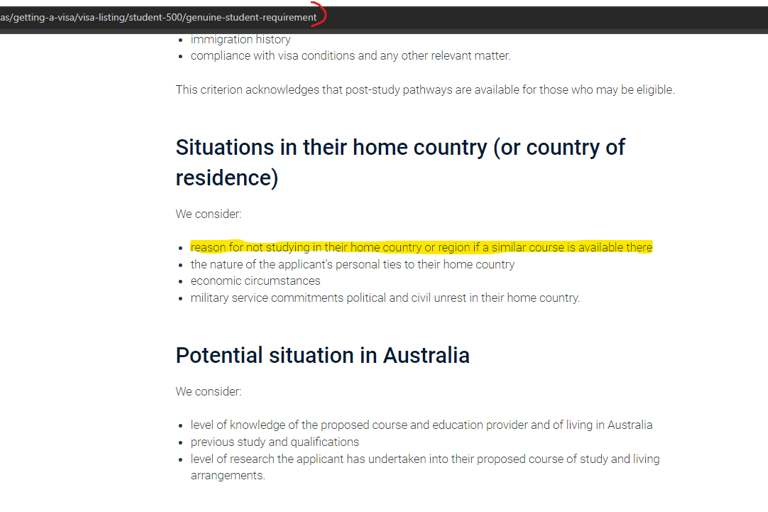

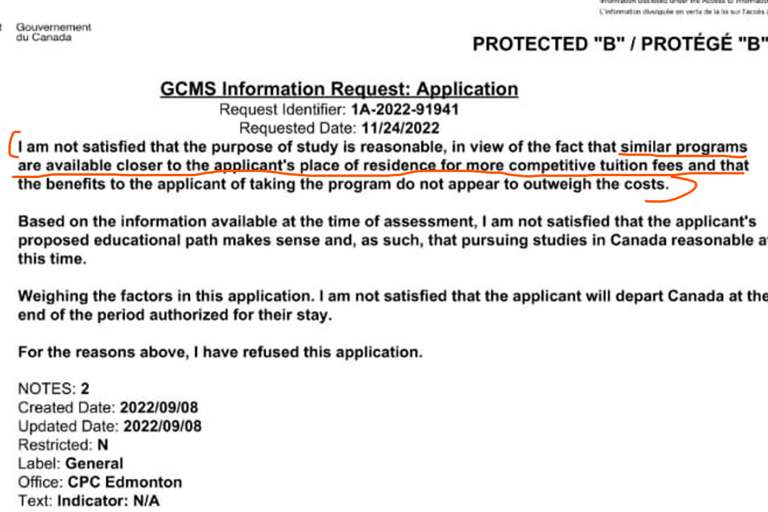

Official guidelines of the Australian Embassy asking to justify local options for GTE (https://immi.homeaffairs.gov.au/visas/getting-a-visa/visa-listing/student-500/genuine-student-requirement)
(How Canadian Embassy refuses, if student does not justifies why he is not choosing local options)
Strategies for Success:
1.Highlight Unique Offerings:
Specialized Programs: Emphasize any unique courses, specializations, or programs offered by the foreign institution that are not available locally.
Example: "The Business Analytics program in Canada includes hands-on training with cutting-edge technology and partnerships with leading companies, which is not available in my home country."
2.International Exposure and Quality of Education:
Global Perspective: Discuss how studying abroad provides you with international exposure, a diverse learning environment, and access to global networks.
Example: "Studying in Canada will allow me to collaborate with students from various cultural backgrounds, enhancing my global perspective and preparing me for an international career."
3.Accreditation and Recognition:
Institutional Prestige: Mention the prestige and global recognition of the foreign institution and how its accreditation adds significant value to your qualifications.
Example: "A degree from a top-ranked Canadian university is highly regarded in my home country and will significantly boost my career prospects."
A view of some lines of our " Why Canada over my homeland" paragraph showing local options.
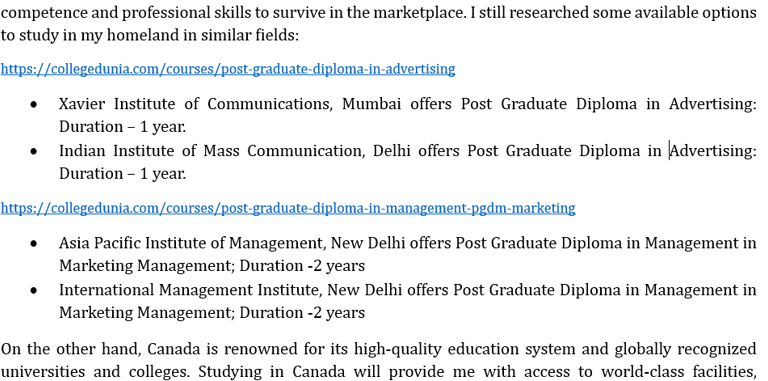

Factor 4:- Student is unable to justify ROI through future goals( or unclear future goals)
Would you invest Rs. 100 if you knew you would only get Rs. 40 back? Probably not. Similarly, visa officers need to be convinced that the money and time you spend on your education abroad will lead to significant career advancements and higher earnings when you return to your home country. To justify your investment in education, you need to clearly outline both your short-term and long-term career goals, and explain how your chosen course of study abroad will help you achieve these goals. Only then does it make sense that you will return seeing a greater return on your investment ( ROI).
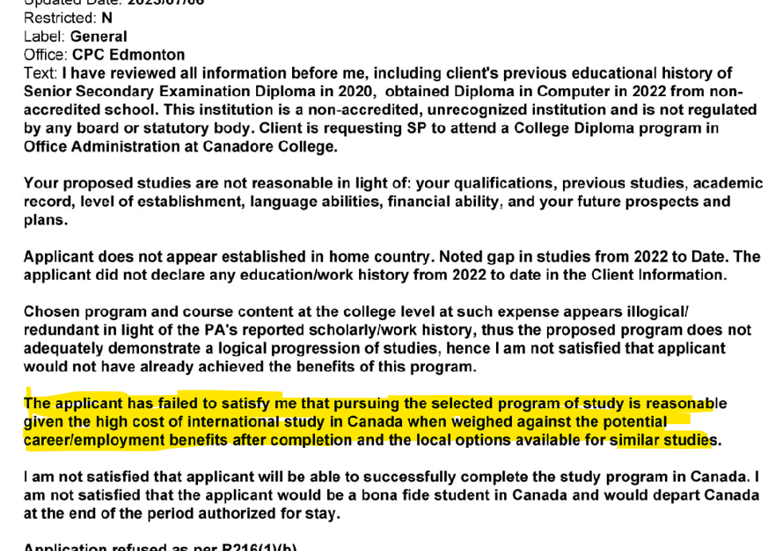

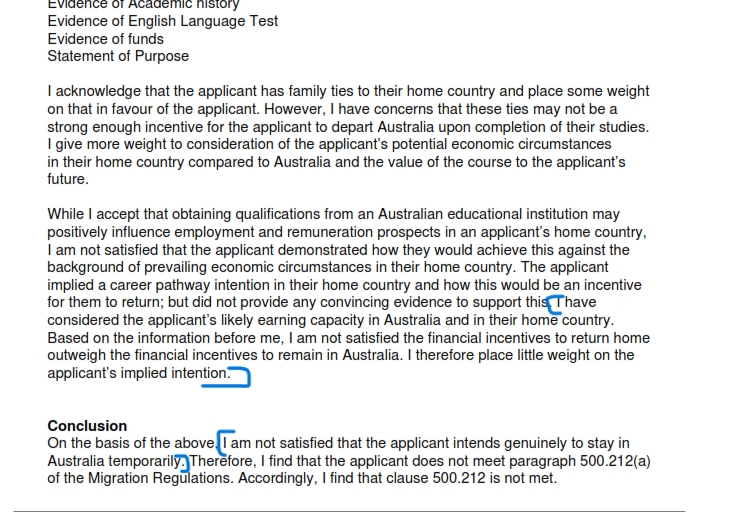

Strategies for Success:
Detail Your Career Goals: Clearly explain how the course will help you secure immediate job roles and long-term career advancement, such as becoming a junior data analyst and eventually a senior analyst.
Show Potential Earnings: Use credible salary data to show the financial benefits of your education, like advanced degree holders earning 50% more than those with only a bachelor's degree. Mention packages you will get.
Highlight Market Demand: Demonstrate that your education will fill specific high-demand skills in your home country, such as the significant need for data analysts with advanced skills.
Economic Justification: Provide a simple cost-benefit analysis to show your educational investment will be profitable, like investing $20,000 to increase annual earnings by $10,000.
Real-World Applications: Explain how your studies will enhance your professional capabilities through practical projects, offering hands-on experience not available locally.
Added Advantages of Studying Abroad: Emphasize the value of international credentials, like a degree from a top Canadian university boosting your career prospects significantly.
Refusal from Canada considering low employment benefits after completion in the homeland ( ROI).
Refusal from Australia on financial incentives upon return ( ROI)
Factor 3 - illogical progression of studies
Visa officers need to see a clear and logical progression from your past education and work experience to your chosen course of study abroad. Think of your educational path as a story: each chapter should naturally follow the one before. If you suddenly jump to an unrelated chapter, it confuses the reader. Similarly, your chosen course should follow naturally from your previous studies and work, creating a coherent narrative.
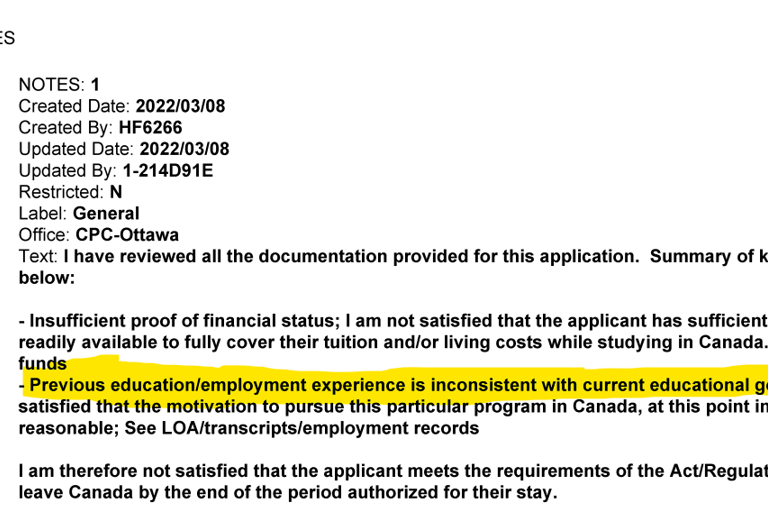

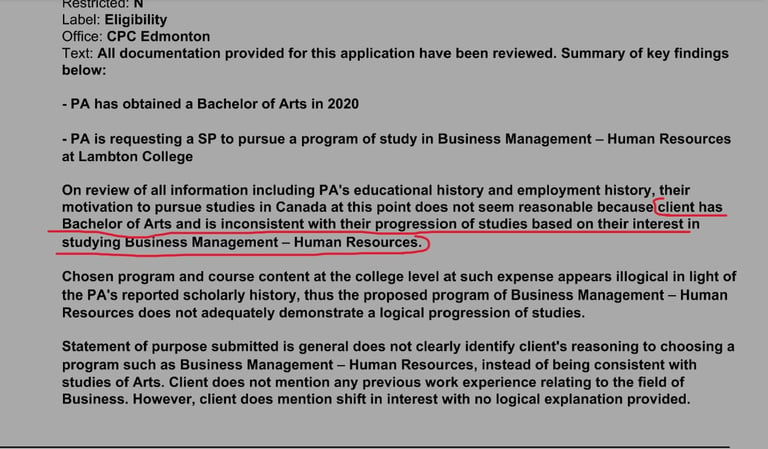

Difference in upcoming course and previous work experience
See how the embassy has refused saying you have done B.A. and now you want to do H.R. Management. Illogical progression
How to justify stream change in Statement of Purpose ( Sop)?
Transitioning from one field to another can be justified by emphasizing the broader impact you aim to achieve in your new area of study. While technical skills in your initial field are crucial, understanding the larger context in which your industry operates—including financial, operational, and strategic aspects—is essential. Pursuing a new stream will equip you with the interdisciplinary skills needed to make strategic decisions, lead innovations, and contribute more effectively at a higher level.
How we helped our client go from the Medical stream to an MBA, even after he had 7 years of experience in the medical field and was refused by the embassy before
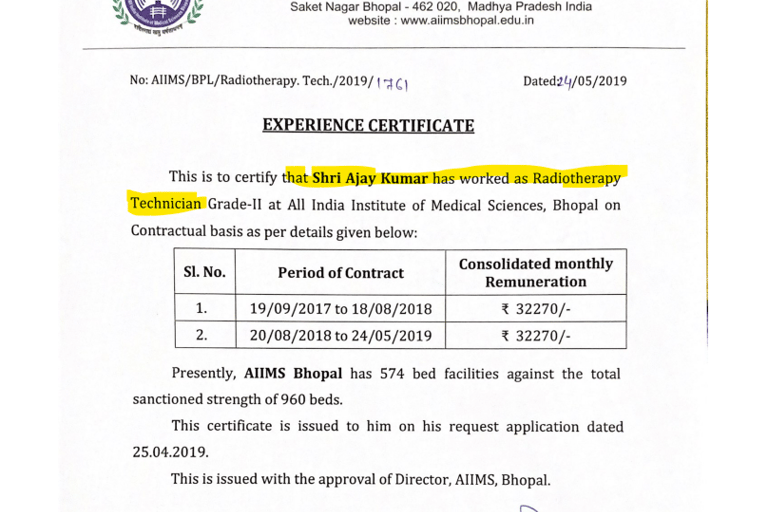

He had work experience of over 7 years, first at PGI Chandigarh and then at AIIMS Bhopal
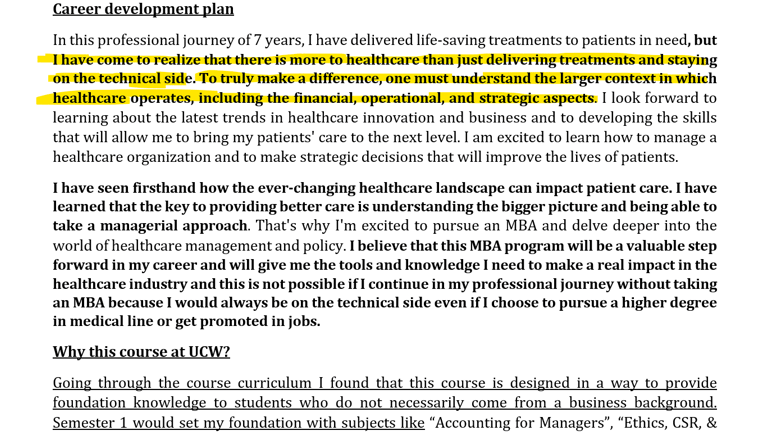

We clearly justified the importance of changing the stream and why it is necessary.
For more details on his story, and how he got the visa, watch our video ( skip to 05:53) -https://www.youtube.com/watch?v=9sMjSnJ-qFM
Strategies for Success:
Align Course with Career Goals: Clearly explain how the chosen course directly aligns with your career aspirations, showing a logical progression from your previous studies or job roles. Example: "Having completed my bachelor's in business, this MBA will provide the necessary skills to advance to a managerial role."
Fill Knowledge Gaps: Highlight any gaps in your current knowledge or skills that the new course will address, ensuring a smooth and necessary educational transition. Example: "The advanced finance modules in this program will equip me with the expertise needed for senior financial analyst positions."
Showcase Relevance: Demonstrate the relevance of your chosen course to your past academic or professional experiences, making it clear why this is the next logical step. Example: "My experience in marketing has shown me the importance of data analytics, which this course will specialize in."
Career Advancement: Explain how the course will facilitate your career advancement, providing specific examples of how it will help you achieve your professional goals. Example: "This course's focus on international business strategies will prepare me for leadership roles in global companies."
Professional Development: Emphasize how the course will contribute to your overall professional development and enhance your skill set in ways that are directly applicable to your career. Example: "The practical projects and internships offered will give me hands-on experience, making me job-ready for the tech industry."
Factor 2- Low Academic Scores or Backlogs( in core subjects)
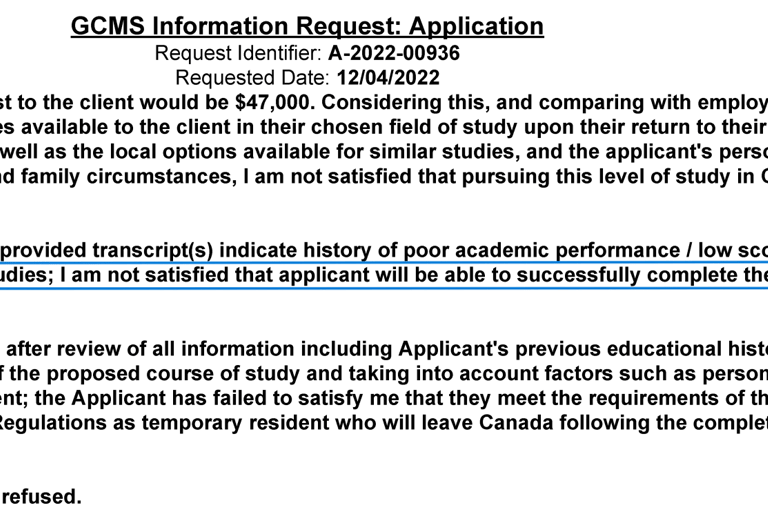

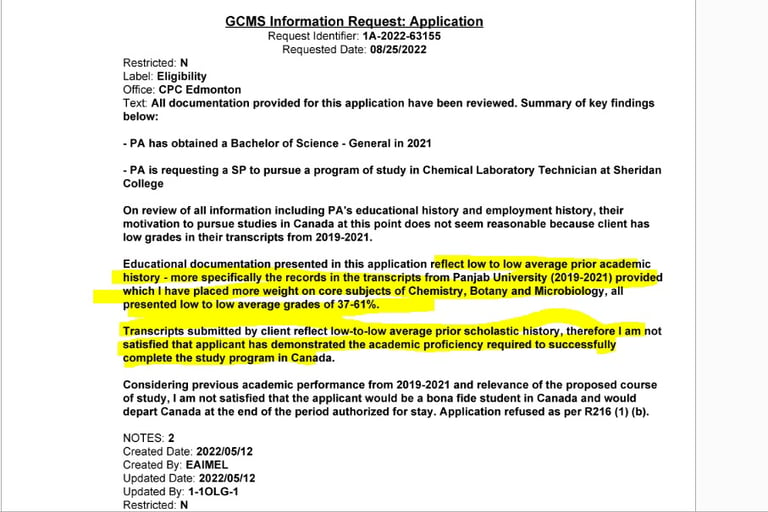

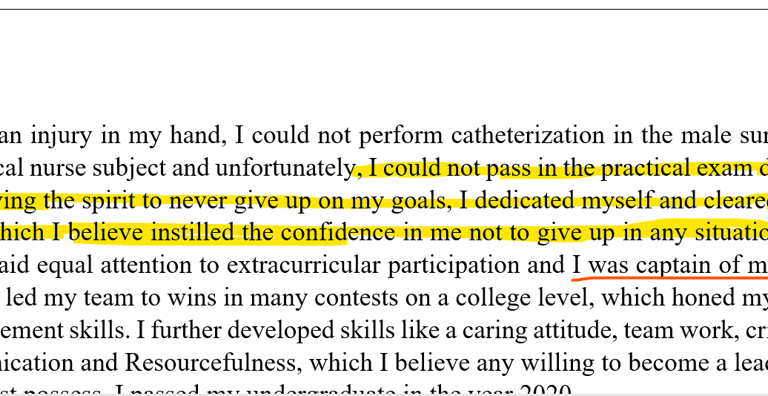

The visa officers closely examine your academic history to see if you can handle studying abroad. Low scores or many backlogs can make them worry about your ability to succeed and maintain your status as a student. This concern is heightened because studying abroad comes with other challenges like culture shock, cooking for yourself, and managing everyday tasks. It's important to address these concerns directly and clearly.
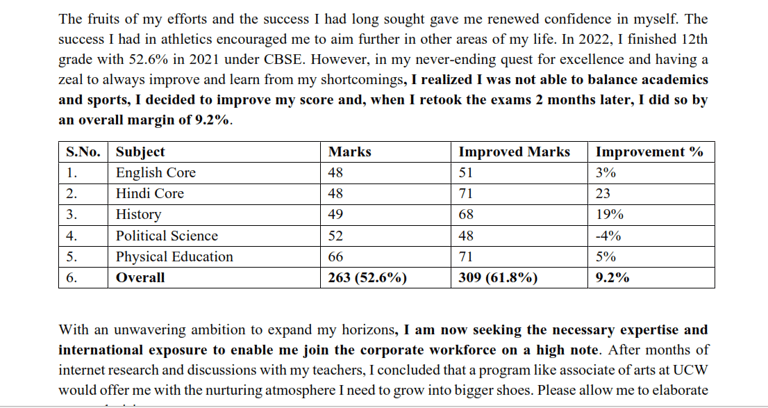

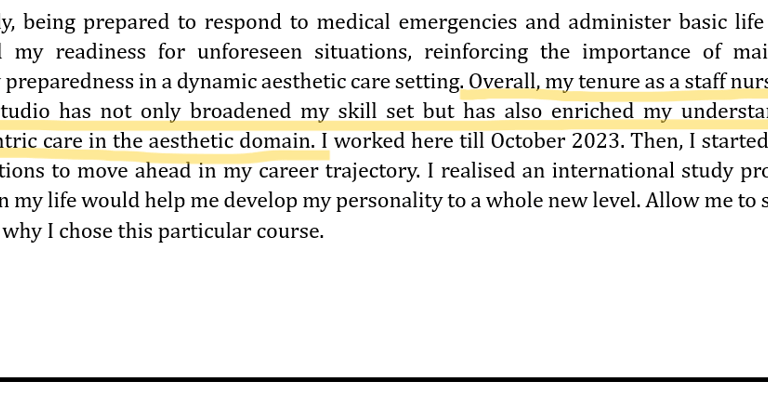

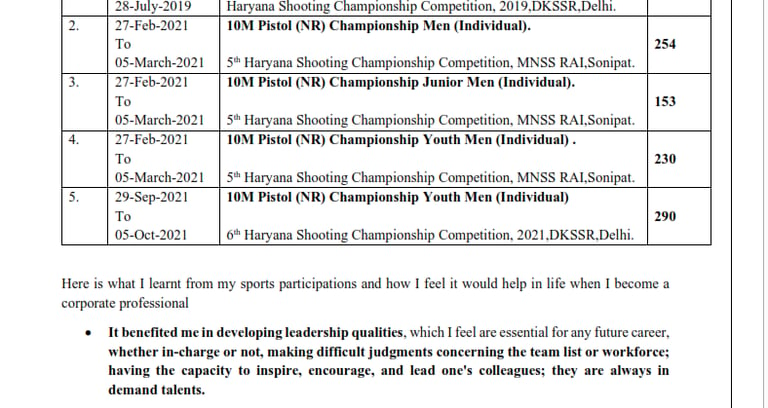

Checkout these refusals because of low scores
See below how to provide Justification by showing other aspects of personality development
a) show improvement ( if done)
c) mention work exprience and important skills you gained later in life
d) Mention natinal/ district level sport participations ( foreign universities values sports a lot!)
All these justifications got visas because here instead of hiding weaknesses ( which are anyhow visible through transcripts) we are showing how we overcame them and we have learned something areas, equally important in life.
Strategies for Success:
Explain Low Scores: Mention extracurricular activities or sports participation to show personal development despite low scores.
Highlight Improvements: Show recent academic achievements to demonstrate your ability to succeed.
Take Extra Courses: Mention additional courses or certifications undertaken to improve your skills.
Emphasize Work Experience: Highlight relevant work experience that shows your skills and dedication.
Get Strong Recommendations: Include recommendation letters from professors or employers who can vouch for your abilities.
Addressing Specific Concerns:
Health Issues: Provide medical certificates and ensure you have adequate proof to explain any health-related impacts on your academic performance. Do not makeup stories about health or personal issues in any statement of purpose.
Personal or Family Challenges: Discuss any personal or family issues that affected your grades and how you managed to overcome them.
Improve Language Skills: Mention steps taken to improve language proficiency if language barriers affected your scores.
b) show extracurriculars
Factor 1: Document Inconsistency
Strategies for Success:
Double-Check All Documents:
Ensure that all your documents are accurate and up-to-date.
Verify that names, dates, and other details are consistent across all documents.
Organize Your Documents:
Arrange your documents in a logical order, making it easy for visa officers to review them.
Provide a cover letter or document checklist to highlight the contents of your application package.
Consistent Information:
Ensure that the information provided in your application forms matches the information in your supporting documents.
Avoid discrepancies in details such as dates of employment, educational qualifications, and personal information.
Professional Assistance:
Consider using professional SOP writing services to ensure that your documents are well-prepared and error-free.
Seek guidance from immigration consultants to avoid common pitfalls.
Provide Clear Explanations:
If there are any unavoidable discrepancies, provide a clear and concise explanation in a cover letter.
Include supporting documents to substantiate your explanations.
Specific Issues:
Documents Not Uploaded / Gap Years:
Make sure to upload all required documents and explain any gaps in your academic or professional history.
Provide a detailed timeline in your cover letter to account for any periods of inactivity or missing documentation.
Documents from Non-Recognized Institutes:
Ensure that your educational and professional qualifications come from recognized institutions.
Include additional supporting documents to validate the credibility of your qualifications if necessary.
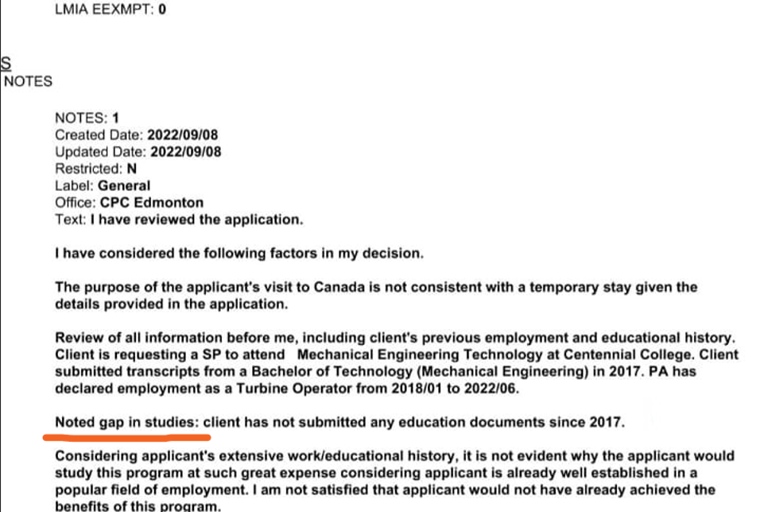

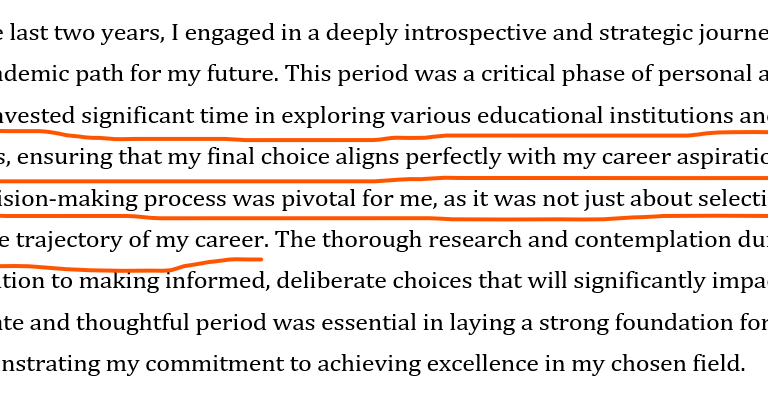

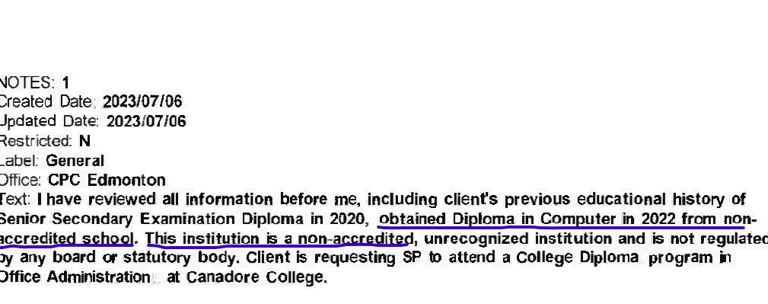

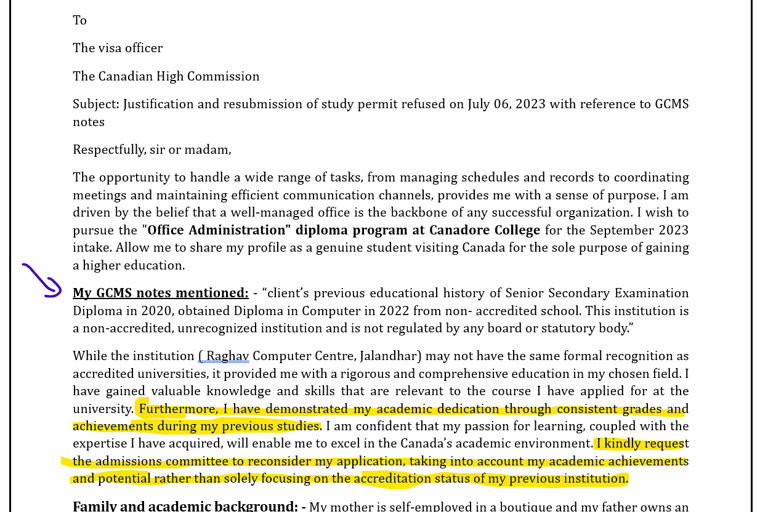

Documents not uploaded (gap years)
Justify in Sop like this to ensure you used that period positively
Before- See how embassy has identified that diploma certifate is not real
Write your text here. One of the most common reasons for visa refusals is document inconsistency. This often happens due to two main reasons:
Documents not being uploaded (or gaps in your academic or professional history),
Documents from non-recognized institutes (Ambigous documents).
After- Here we helped this client overcome the refusal, we mentioned that it was not his fault if the institution was not accredited. he has always taken his academics seriously and performed well. If you can stand your ground, you deserve your visa.
Lastly- family obligations not higlighted
While not originally listed as a primary factor, "Family Ties" is crucial in visa decisions. Visa officers place a high emphasis on your ties to your home country. Strong evidence of family connections, property, employment commitments, and other personal ties demonstrates your intent to return home after completing your studies. This is a critical factor in determining your visa application's success.
Strategies for Success:
Highlight Family Connections:
Provide evidence of close family relationships in your home country.
Include letters from family members affirming your return plans.
Mention real circumstances, not just emotional ties. For example, explain why your parents cannot leave India due to their jobs or businesses, which need them to stay and require your support.
Show Employment Commitments:
Present job offers or contracts that indicate your employment upon return.
Include letters from employers stating that your position will be available after your studies.
Demonstrate Property Ownership:
Provide documents showing ownership of property or long-term leases in your home country.
Highlight any investments or businesses that tie you to your home country.
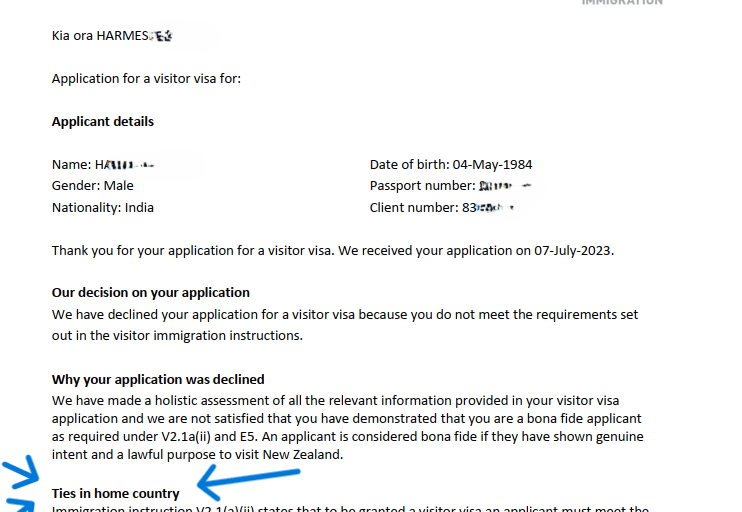

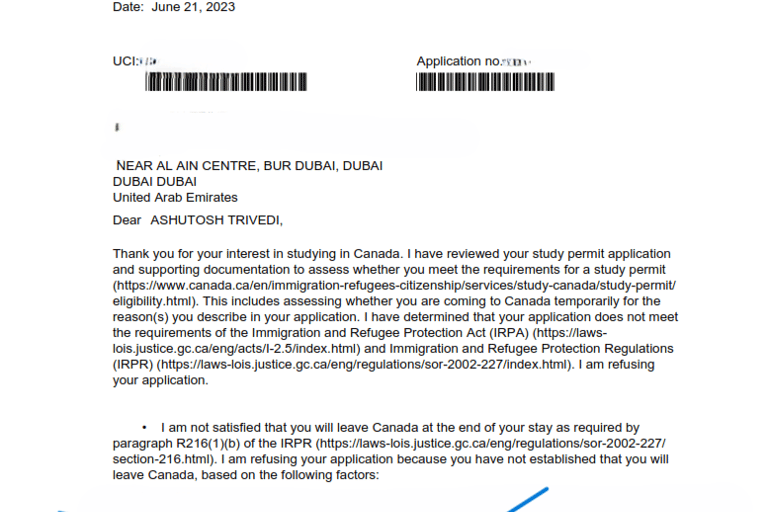



Refusal from New Zealand on home ties
Refusal from Canada stating you don't have significant family ties outside cannot. So you will not return.

Watch our featured video on these 7 factors with case studies and success stories
Conclusion
Securing a study visa involves understanding and addressing common reasons for refusals. The seven factors discussed—document inconsistency, low academic scores, illogical progression of studies, opting to study abroad despite local options, financial and language ability, inability to justify return on investment, and extensive work experience—are crucial. Additionally, the most important factor, Family Ties, should not be overlooked. Demonstrating strong connections to your home country through family relationships, employment commitments, and property ownership can significantly strengthen your application.
For a successful visa application, consider using professional SOP writing services. Our expert SOP writers are skilled in crafting compelling statements that address these critical areas, helping make your case strong and convincing.
Ready to boost your visa application success? Get your personalized SOP now or chat with us on WhatsApp at +91-7696483445. Our team ensures every detail is meticulously covered, giving you the best chance of approval.
